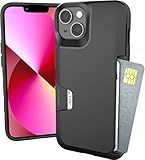Ceramic Shield Uses Ceramic Nanocrystals
Ceramic Shield gets its name from the ceramic nanocrystals that are incorporated into the glass. The structure of these crystals helps to strengthen the glass and protect against chips and cracks.
Another process used in the technology is dual ion exchange, which means larger ion sizes for a more solid end product. Both of these technologies combine to create a tougher display that Apple used in the iPhone 12 and iPhone 13 family of devices.
Like other smartphone manufacturers, Apple previously used Corning’s Gorilla Glass in their earlier models. Ceramic Shield is also manufactured by Corning, but the company manufactures it specifically for Apple so it is only found in Apple models.
RELATED: Is Your Phone’s Touch Screen Damaged? Avoid These Bad Repair Tips
How Does Ceramic Shield Stack Up?
Apple claims that Ceramic Shield is the toughest smartphone glass on the market, but the company is characteristically short on evidence to support that claim.
The agreement between Corning and Apple ensures that Ceramic Shield remains an Apple-exclusive technology. It’s unclear how much tougher Ceramic Shield is compared to Corning’s alternative Gorilla Glass Victus, favored by rival Samsung.
While drop test videos exist, varying methodology and limited sample sizes can make it difficult to draw solid conclusions. One thing is certain: even with an iPhone model that uses Ceramic Shield, the best protection for any smartphone is a good case (or several).
Get a Case Too
The iPhone 13 may have Ceramic Shield protection but it can and will still shatter if you drop it from high enough. Check out the best iPhone 13 cases to protect against drops.
The iPhone SE is also highly drop-resistant, but you can do even better with a good iPhone SE case.














